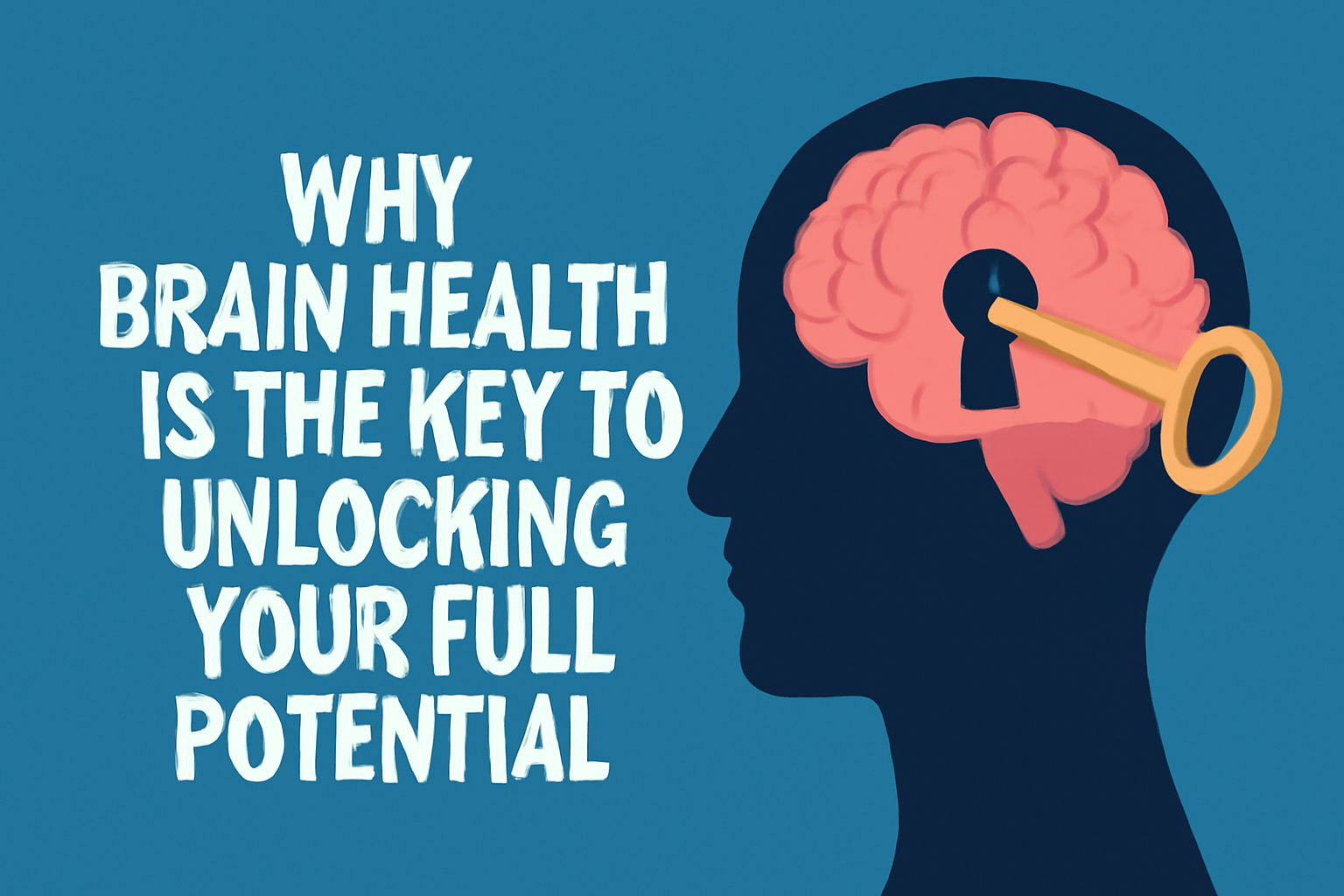Why Brain Health is the Key to Unlocking Your Full Potential

Your mind is the control center of your entire life, and the importance of maintaining good brain health cannot be overstated. From making decisions to managing emotions and building relationships, brain health plays a vital role in every aspect of your life. If you truly want to reach your full potential, focusing on the well-being of your brain is the first step toward achieving greatness. In this blog, we’ll dive into why brain health is critical for unlocking your full potential and how it can be nurtured for a happier, more successful life.
The Connection Between Brain Health and Personal Growth
To understand the importance of brain health, we must first recognize its direct link to personal growth. Our brain governs every thought, emotion, and action that we take, influencing how we handle challenges, approach learning, and even how we see the world. The brain controls our ability to adapt, learn new skills, and overcome obstacles, making it the cornerstone of our personal development journey.
A well-functioning brain enhances cognitive abilities, improves memory, and sharpens our problem-solving skills. When the brain is healthy, we are more likely to make decisions that lead us toward our goals, embrace growth opportunities, and stay motivated even when faced with setbacks. But the reverse is also true—poor brain health can hinder progress, cloud judgment, and lead to missed opportunities.
The Role of Brain Health in Achieving Peak Performance
Imagine your brain as the engine of a car. If it’s running smoothly, the car performs optimally, providing a smooth and efficient ride. However, if the engine is malfunctioning, it will inevitably affect the vehicle’s performance. Similarly, the state of your brain determines how well you perform in every area of your life—whether it’s at work, in your personal relationships, or in achieving your long-term goals.
The connection between brain health and peak performance is undeniable. When your brain is healthy, your cognitive functions are at their best. Your focus, memory, and mental clarity are sharp, making it easier to stay on task and perform at your highest level. This translates into increased productivity, better decision-making, and the ability to handle stress more effectively.
On the other hand, neglecting your brain’s health can result in reduced focus, sluggish thinking, and an inability to process information efficiently. This leads to frustration and a lack of progress, hindering your potential and holding you back from reaching your goals. By taking care of your brain, you equip yourself with the tools to perform at your peak every day.
Understanding Brain Health and How It Impacts Mental Clarity
The impact of brain health on mental clarity is immense. Mental clarity is crucial for maintaining a clear sense of purpose, staying organized, and making well-thought-out decisions. When your brain is healthy, it functions more efficiently, filtering out distractions and enabling you to concentrate on what truly matters.
One of the primary factors that contribute to mental clarity is the health of your brain’s neural networks. These networks are responsible for transmitting signals between different parts of your brain, enabling it to process information quickly and accurately. When these networks are optimized, your brain operates at its best, allowing you to think clearly, set goals effectively, and navigate challenges without feeling overwhelmed.
In contrast, a brain that is not functioning optimally can lead to brain fog, forgetfulness, and difficulty concentrating. This can make it harder to complete tasks and can create a sense of frustration and stress. Improving brain health allows you to restore mental clarity, increase your focus, and stay present in the moment, giving you the mental edge needed to achieve your personal and professional goals.
The Influence of Brain Health on Emotional Well-being
In addition to cognitive benefits, maintaining good brain health also plays a crucial role in emotional well-being. Our emotions are deeply influenced by the state of our brain, and a healthy brain helps regulate mood, manage stress, and foster positive emotional states.
When your brain is in good condition, it can produce the necessary chemicals, such as serotonin and dopamine, that help maintain a stable mood. These “feel-good” hormones are essential for reducing stress, combating anxiety, and preventing depression. On the flip side, poor brain health can lead to an imbalance in these chemicals, resulting in emotional instability, mood swings, and difficulty managing stress.
Maintaining a healthy brain gives you better emotional resilience, allowing you to bounce back from setbacks with a positive attitude. It enables you to better handle life’s ups and downs, making it easier to stay calm, focused, and optimistic—qualities that are essential for achieving your full potential.
How Nutrition Plays a Role in Brain Health
Just like any other part of your body, your brain requires proper nutrition to function effectively. Your diet plays a significant role in nourishing your brain and supporting its long-term health. Certain foods are particularly beneficial for brain function, including those rich in antioxidants, healthy fats, and essential vitamins and minerals.
Foods like berries, leafy greens, and nuts are packed with antioxidants that protect brain cells from oxidative stress and inflammation, which can contribute to cognitive decline. Omega-3 fatty acids found in fish, flaxseeds, and walnuts are essential for brain cell communication and are known to improve memory and focus. Additionally, vitamins such as B6, B12, and folate are critical for maintaining healthy brain function and preventing neurological issues.
By prioritizing a brain-boosting diet, you can enhance cognitive function, increase memory retention, and keep your mind sharp. Investing in the health of your brain through nutrition is one of the most powerful ways to unlock your full potential and support your overall well-being.
Exercise and Brain Health: The Powerful Connection
Physical activity is not just good for the body—it’s also incredibly beneficial for the brain. Exercise has been shown to improve cognitive function, enhance memory, and even promote the growth of new brain cells. It increases blood flow to the brain, delivering oxygen and essential nutrients that support optimal brain function.
Regular exercise also stimulates the production of brain-derived neurotrophic factor (BDNF), a protein that supports the growth and maintenance of neurons. BDNF has been linked to improved learning, memory, and overall brain health. Even moderate forms of exercise, such as walking or yoga, can have a positive impact on brain function, making it an accessible and effective tool for unlocking your potential.
In addition to the cognitive benefits, exercise has a positive effect on mood and emotional well-being. It promotes the release of endorphins, which are natural mood elevators, helping to reduce stress and anxiety. By incorporating regular physical activity into your routine, you can improve both your physical and mental health, creating a powerful foundation for success.
Mindfulness and Mental Training for Optimal Brain Health
Beyond physical activity and nutrition, mental training is another important aspect of maintaining brain health. Practices like mindfulness meditation, deep breathing exercises, and mental focus techniques have been shown to enhance cognitive performance and emotional regulation.
Mindfulness, in particular, has been proven to improve brain plasticity—the brain’s ability to change and adapt over time. Regular mindfulness practice strengthens the areas of the brain responsible for memory, emotional regulation, and decision-making. It also helps reduce stress, promote relaxation, and enhance overall brain function, contributing to better mental clarity and focus.
Incorporating mental training into your daily routine can significantly improve your brain health and provide you with the tools to manage stress, increase focus, and enhance cognitive performance. As a result, you’ll be better equipped to pursue your goals with a clear mind and a strong sense of purpose.
Quality Sleep and Brain Health: A Vital Relationship
Sleep is another crucial factor in maintaining good brain health. While you sleep, your brain goes through essential processes that support memory consolidation, emotional regulation, and cognitive function. Lack of sleep or poor-quality sleep can impair brain function, leading to reduced memory retention, difficulty concentrating, and increased irritability.
During sleep, your brain also removes toxins that have accumulated throughout the day, ensuring that it remains in optimal condition. Chronic sleep deprivation has been linked to cognitive decline and an increased risk of mental health issues, including depression and anxiety. Prioritizing quality sleep allows your brain to recharge, repair, and function at its best, helping you unlock your full potential.
Conclusion
Brain health is the foundation upon which your entire potential is built. By focusing on nutrition, exercise, mental training, mindfulness, and sleep, you can improve your cognitive abilities, emotional well-being, and overall performance. Your brain is your greatest asset—taking care of it will empower you to reach your goals, unlock your full potential, and live a more fulfilling life.
To learn more about enhancing brain health, visit https://reignitethemind.com.
